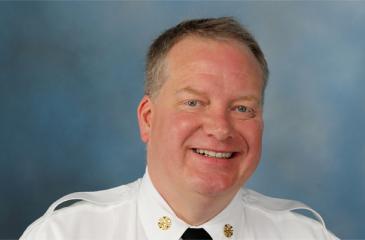As the Richfield Fire Chief for the past nine years, Wayne Kewitsch has dedicated his professional life to responding to emergencies and saving lives. On July 1, 2020, that passion and dedication came full circle to save his own life.
What started out as a routine day at his Edina residence quickly turned into anything but ordinary when Kewitsch suffered a heavy chest pain that he attributed to reflux.
“It was the Wednesday before the Fourth of July,” said Kewitsch. “I didn’t have any other symptoms besides the chest pain, and it seemed to go away, although looking back I certainly didn’t feel well.”
That symptom of not feeling well quickly escalated into his wife finding him unresponsive and turning blue. After a call to 911, Kewitsch’s oldest son started CPR chest compressions.
“My oldest and youngest sons are both Eagle Scouts and know CPR,” said Kewitsch. In fact, to earn their First Aid Merit Badge, Kewitsch had taught them both CPR.
While the CPR was underway, an Edina police officer responded to the 911 call quickly followed by paramedics with the Edina Fire Department.
“The paramedics shocked me once in the house,” said Kewitsch. “This gave me a pulse back, but I went into ventricular fibrillation once again in the ambulance even with two additional shocks while in transit.”
Recognizing that Kewitsch was suffering from refractory ventricular fibrillation, they knew he met the criteria for extracorporeal membrane oxygenation—or ECMO—and rushed him to M Health Fairview University of Minnesota Medical Center. Led by the University’s Center for Resuscitation Medicine and Professor of Medicine Demetri Yannopoulos, MD, one form of the University’s innovative ECMO program is used to provide temporary heart or lung support for a number of conditions including cardiac arrest. Yannopoulos leads the Minnesota Mobile Resuscitation Consortium (MMRC), a collaborative initiative to treat cardiac arrest as quickly as possible in Minnesota. Supported by the Office of Academic Clinical Affairs, the Center for Resuscitation Medicine makes ECMO accessible throughout the Twin Cities.
After arriving at the hospital, Kewitsch had two stents placed in his left anterior descending coronary artery by Jason Bartos, MD, PhD, and was discharged two days later.
SAVING LIVES THROUGH PREPARATION, OUTREACH AND EDUCATION
According to Program Manager Kim Harkins of the University’s Center for Resuscitation Medicine, Kewitsch’s story illustrates how Minnesota is a leader in pre-hospital resuscitation.
“The chain of survival is something I’m very passionate about and it’s how we save lives,” said Harkins. “We strongly support the programs, education and services, so we have the opportunity to save patients so they can get to the hospital for the excellent care we are known for in Minnesota.”
At the Richfield Fire Department, Chief Kewitsch has long been committed to education with his team.
“We’ve always tried to be on the leading edge,” said Kewitsch. “Each shift practices cardiac arrest management every three weeks—a day we call CPR Monday. And in our collaborative relationship with the Edina Fire Department, I know that they have a similar commitment.”
It’s a commitment that very well may have saved Kewitsch’s life and one he is grateful for.
“It is so critical for people to understand and recognize sudden cardiac arrest, and I cannot emphasize enough the importance of people learning and giving bystander CPR,” said Kewitsch. “Between the CPR at home, EMS team and the cardiac care I received at the University of Minnesota Medical Center, I am truly amazed at the level of care I received.”
REGISTER TODAY FOR A FREE VIRTUAL CPR TRAINING
To register for a free virtual CPR training, visit the Center for Resuscitation Medicine’s Facebook page or view the schedule online. Virtual CPR training sessions are also available in Spanish.



